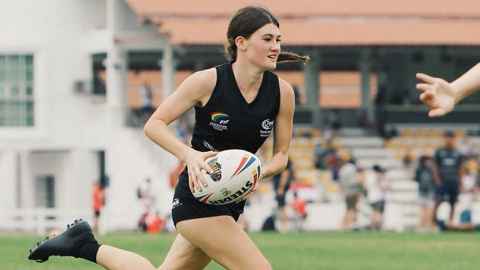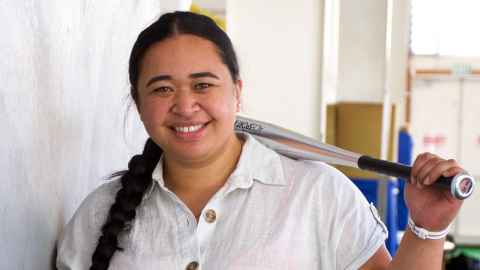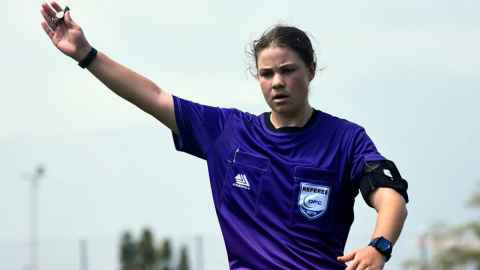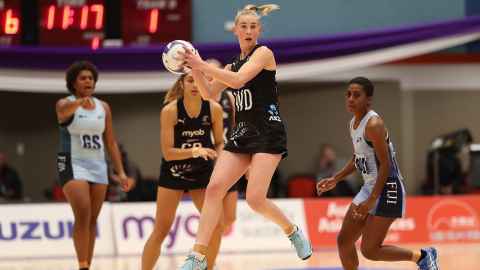Throwing like a girl: women at the top of their game
6 March 2020
To celebrate International Women’s Day, we caught up with some of our top female athletes to find out what it’s like to be a woman in sport.
International Women’s Day, themed #EachforEqual this year, is a good reminder to challenge inequities, broaden perspectives and celebrate women's achievements. Sport is one of many areas where women can face more barriers and inequities than their male counterparts.
But that hasn’t stopped Isla Norman-Bell, Jamie Hume, Clarissa Mafoe, Beth Rattray or Michaela Sokolich-Beatson – five Education and Social Work students at the top of their sports. We spoke to them about challenges they’ve faced, the importance of celebrating women’s achievements and the exciting developments in the field of women’s sport.
Isla Norman-Bell – Bachelor of Sport, Health and Physical Education

What’s been your biggest challenge as a woman in sport?
One challenge I have faced would be not getting any financial support to train and play rugby at women’s provincial level, whereas boys straight out of school get financial support from the union.
Who is your biggest inspiration?
There have been many inspirational women through my life including both of my grandmothers, my mum, sportswomen and politicians. They have all been strong, motivated women with no fear of pursuing their ambitions.
Any advice for girls who want to get into sport?
Try lots of different sports until you find the one you love!
Why do you think International Women’s Day is important to celebrate?
I think having a day focused on celebrating women is important to remind people of the great things being achieved in the world by women. Often women's achievements are overshadowed by male news in the media.
What is your proudest achievement in sport?
Being named University of Auckland Sportswoman of the Year in 2019.
Clarissa Mafoe – Bachelor of Sport, Health and Physical Education

What’s been your biggest challenge as a woman in sport?
Feeling the need to compete against men in the same code. There is still a bit of a preconceived belief that women cannot perform at the same level of intensity as men. However, I believe nowadays women are finding our own way of owning the sport we play. Society’s perspectives are changing, and people are taking women’s sports more seriously.
Who is your biggest inspiration?
There are so many women that have inspired me in some way in sport. The likes of Luisa Avaiki, Valerie Adams, Beatrice Faumuina, Rita Fatialofa, Sophie Pascoe and so many more. These ladies have been trailblazers for women’s sport in New Zealand. These ladies inspired helped me to realise that, the only person in the way of achieving your goals is yourself. It doesn't matter from what background we were raised in, there's no excuse to not being able to achieve your dreams.
Any advice for girls who want to get into sport?
My advice for girls who want to get into sport would be to break away from the negative connotations of 'run/throw like a girl'. Never be afraid of being a leader. Never lose sight of your 'why'.
Why do you think International Women’s Day is important to celebrate?
I feel that women don't always get the recognition they deserve. It's about celebrating each other’s achievements and women empowering women.
What is your proudest achievement in sport?
Being able to represent New Zealand for softball and being appointed captain for the New Zealand development team.
Jamie Hume – Graduate Diploma in Teaching (Primary)
Jamie plays netball for the Northern Stars.
What’s been your biggest challenge as a woman in sport?
The comparison between males and females in sport, and the resources available to us. It's no secret that there is more money and resourcing available in men’s sport and I understand that it’s due to the revenue that sports like men’s rugby, men’s basketball and men’s cricket bring in.
As women athletes we are expected to train the same amount, commit the same amount of time and effort to something that doesn't give back anywhere near as much as a male sport would. Most female athletes in New Zealand need to have another career running alongside their sporting one to make ends meet, making it something extra that has to be juggled with an already intense sporting schedule.
I absolutely love what I get to do as an athlete, and I wouldn't change it! But if we had the same resources available to us as the All Blacks for example, imagine how good we could be. However, women's sport is moving in an awesome direction at the moment so watch this space!
Any advice for girls who want to get into sport?
Just do it! There are too many girls that stop playing sport after they leave school because it becomes too hard or it takes too much effort. It doesn't! Start a social netball team with your friends or enter a weekly touch competition with your work mates. You don't have to train like you are going to world champs, just enjoy it and have fun! That's what sport is all about.
Why do you think International Women’s Day is important to celebrate?
It's so important to create awareness that through women celebrating women (or anybody celebrating women for that matter), we have the ability to move towards a gender equal society. If we continue to celebrate the incredible achievements of women, our conversations and mindsets can change the way women are perceived, treated and valued.
Beth Rattray - Bachelor of Sport, Health and Physical Education

What’s been your biggest challenge as a woman in sport?
Getting the same opportunities as men. Growing up there were limited sports I could participate in just because there weren’t the numbers for female team, often due to lack of resources. It has been good to see that, over the years, this has become less of a challenge.
Who is your biggest inspiration?
Lisa Carrington. She has been so dominant in her field for such a long time. It just shows that with hard work and determination, it can be done.
Any advice for girls who want to get into sport?
Give it a go, you won't know if you don't try. There are lots of opportunities out there for women in sport and it’s a great way to have fun with your friends.
Why do you think International Women’s Day is important to celebrate?
To recognise the achievements that women have made over the years, especially those that have led to equality in sport.
What is your proudest achievement in sport?
Refereeing at an Oceania Football Confederation tournament in Fiji, where I got to be involved in football at a level I would never have got to as a player.
Michaela Sokolich-Beatson – Bachelor of Physical Education*

What’s been your biggest challenge as a woman in sport?
There is nothing that springs to mind when I think of “challenges” as a woman in sport. I feel very fortunate that I get to go to “work” each day surrounded by a very inspiring group of women. Everyone in my Northern Mystics team either works, or studies alongside playing netball. We all come together for a common purpose, which is to train at our absolute best and push ourselves to be fitter, faster, stronger and ultimately the best versions of ourselves. I feel privileged to be in this position.
Who is your biggest inspiration?
My biggest inspirations would be all the strong women around me which, in my line of work, is so many. My mum, aunty, nana, all my Northern Mystics and Silver Ferns teammates and my amazing friends. Each and every one of them inspires me in different ways.
Any advice for girls who want to get into sport?
Don’t be scared, go and join that club, school team or social team. The most important thing is do it because you want to and because you love it.
Why do you think International Women’s Day is important to celebrate?
I think it is important to acknowledge the strong women that walk among us. Everyone is strong and unique in their own individual way. I think we should embrace that. I also think we don’t need a day to do that; it’s something we should be doing all the time.
*The faculty introduced the Bachelor of Sport, Health and Physical Education in 2017 after the Bachelor of Physical Education programme was suspended.